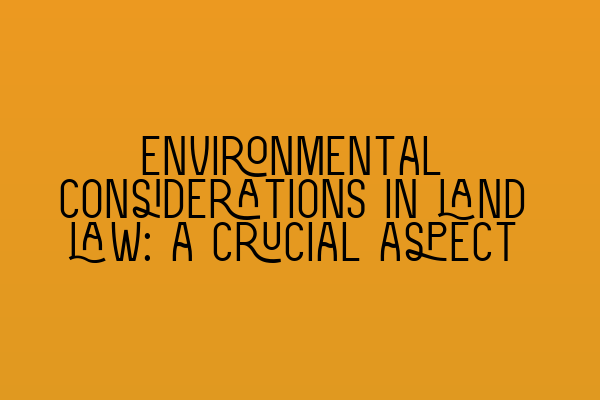Environmental Considerations in Land Law: A Crucial Aspect
Introduction
In today’s world where the impact of human activities on the environment is becoming increasingly evident, it is crucial for property law practitioners to consider environmental factors when advising clients. Environmental considerations in land law play a significant role in ensuring sustainable development, protecting the ecosystem, and complying with legal obligations.
In this blog post, we will explore the importance of incorporating environmental considerations into land law practices. We will examine how environmental regulations and policies influence property transactions, planning, and development. Let’s dive into this crucial aspect of land law.
1. Environmental Impact Assessments (EIAs)
For any significant development project, an Environmental Impact Assessment (EIA) is often required by law. An EIA aims to identify and assess the potential environmental effects of proposed developments, allowing decision-makers to make informed decisions. It considers factors such as air and water pollution, habitat destruction, and biodiversity loss.
By considering the outcomes of an EIA, property law professionals can ensure that their clients comply with environmental regulations, avoid legal disputes, and minimize adverse environmental impacts.
2. Planning Permission and Environmental Constraints
Obtaining planning permission for property development is a crucial stage in any project. Local planning authorities consider various factors before granting permission, one of which is the environmental impact of the proposed development.
Environmental constraints such as designated protected areas, flood risk zones, or wildlife habitats can restrict or influence the type and scale of development. It is vital for property law experts to work closely with environmental consultants to assess and navigate these constraints effectively.
3. Sustainable Land Use and Remediation
Promoting sustainable land use is essential in minimizing the ecological footprint of human activities. Property law practitioners should encourage their clients to adopt environmentally friendly practices such as brownfield redevelopment, sustainable drainage systems, and renewable energy solutions.
Furthermore, the remediation of contaminated land is an essential aspect of land law. Recognizing and addressing environmental liabilities associated with contaminated land is crucial for protecting human health and ensuring compliance with environmental legislation.
4. Climate Change Resilience
With the increasing impacts of climate change, it is necessary to consider climate resilience in property transactions and land management. Climate resilience includes measures such as flood risk assessments, the consideration of future sea-level rise, and energy efficiency.
As a property law professional, advising clients on climate resilience can help them mitigate future risks, ensure the longevity of their investments, and comply with evolving environmental regulations.
5. Legal Obligations and Liability
Property law practitioners should be well-versed in the legal obligations and liabilities associated with environmental matters. Understanding the scope of environmental legislation, including the Environmental Protection Act 1990 and the Conservation of Habitats and Species Regulations 2017, is crucial for providing accurate advice.
Additionally, legal liabilities may arise in cases of environmental pollution or damage caused by property development. It is essential to conduct proper due diligence, assess potential environmental risks, and establish appropriate safeguards to protect clients from legal repercussions.
Conclusion
Environmental considerations in land law are no longer optional but necessary. Incorporating these considerations into property transactions, planning, and development processes is crucial for sustainable and responsible land management.
By advising clients on environmental impact assessments, planning constraints, sustainable land use, climate resilience, and legal obligations, property law practitioners can help protect the environment, ensure compliance, and mitigate risks.
At SQE Property Law & Land Law, we understand the importance of environmental considerations in land law. Contact us today to discuss how we can assist you with your property law needs.
Related Articles:
– SQE 1 Practice Exam Questions
– SQE 1 Practice Mocks FLK1 FLK2
– SQE 2 Preparation Courses
– SQE 1 Preparation Courses
– SRA SQE Exam Dates
